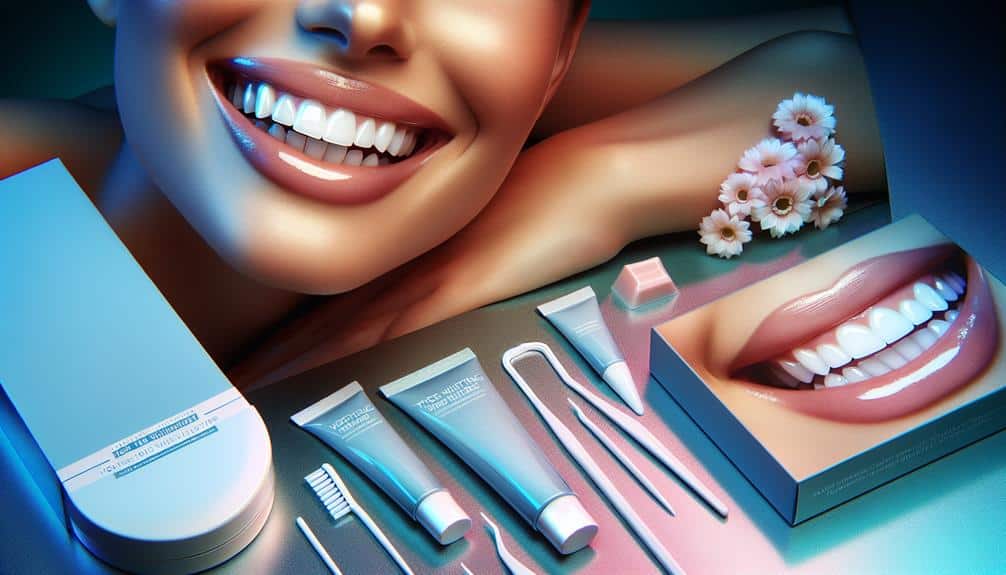Looking to brighten your smile without peroxide? Consider natural whitening agents like lemon or baking soda for their gentle yet effective stain removal properties. Another alternative is enamel-safe whitening toothpaste, offering gradual whitening alongside sensitivity relief and fluoride protection. For a more advanced option, LED light whitening technology provides professional-level results at home in a shorter time. Hydrogen peroxide-free whitening gels are also worth exploring, offering a safe and convenient way to achieve a brighter smile. These alternatives could be the key to achieving your desired whiter smile naturally.
Key Points
- Consider natural whitening agents like fruit extracts and baking soda for peroxide-free whitening.
- Opt for charcoal-based whiteners for effective and gentle teeth whitening without peroxide.
- Choose enamel-safe whitening toothpaste for a safe and gradual whitening process.
- Explore LED light whitening technology for professional-level results without peroxide.
- Use hydrogen peroxide-free whitening gels for effective and enamel-safe whitening at home.
Natural Whitening Agents
Looking for a peroxide-free alternative for whitening your teeth? What natural whitening agents are effective and safe to use?
Fruit extracts and baking soda are two natural whitening agents that have shown promise in brightening teeth without the use of peroxide. Fruit extracts like lemon, orange, and strawberry contain natural acids that can help break down stains on the teeth's surface. However, it's crucial to utilize these extracts sparingly as their acidic nature may erode tooth enamel over time if used excessively.
On the other hand, baking soda is a gentle abrasive that can help scrub away surface stains on teeth effectively. Its mild abrasiveness makes it a popular ingredient in many natural toothpaste and whitening products. When used in moderation, baking soda can be a safe and effective way to achieve a brighter smile without the need for peroxide.
Remember to consult with your dentist before incorporating any new whitening agents into your oral care routine to validate they're appropriate for your dental health.
Charcoal-Based Whiteners
Charcoal-based whiteners have gained popularity in the dental care market for their purported ability to remove surface stains and brighten teeth. Charcoal toothpaste and activated charcoal powders are two common products in this category. Activated charcoal is known for its adsorbent properties, which can bind to substances like plaque and surface stains on teeth, leaving them looking brighter.
When utilizing charcoal-based whiteners, it's crucial to be cautious. While they can be effective in removing surface stains, they may not necessarily change the natural color of your teeth or penetrate deeply to whiten below the surface. Additionally, activated charcoal is abrasive and could potentially wear down the enamel if used too vigorously or too frequently. It's advisable to consult with a dental professional before incorporating charcoal-based whiteners into your oral care routine.
While charcoal-based whiteners can provide some cosmetic benefits, they may not be suitable for everyone. Individuals with sensitive teeth or those concerned about enamel erosion should proceed with caution when using these products.
Enamel-Safe Whitening Toothpaste
Consider incorporating enamel-safe whitening toothpaste into your oral care routine for a gentle yet effective way to brighten your smile. Enamel-safe whitening toothpaste not only helps whiten your teeth but also provides additional benefits like sensitivity relief and fluoride protection. Here are some key reasons why enamel-safe whitening toothpaste is a great addition to your oral care regimen:
- Gentle Whitening: Enamel-safe whitening toothpaste offers a gentle approach to removing surface stains, resulting in a brighter smile without causing harm to your enamel.
- Sensitivity Relief: Many enamel-safe whitening toothpaste formulas are designed to help alleviate tooth sensitivity, making it suitable for those with sensitivity issues.
- Fluoride Protection: These toothpastes often contain fluoride, which helps strengthen enamel and prevent tooth decay.
- Daily Use: Using enamel-safe whitening toothpaste daily can gradually improve the whiteness of your teeth without the need for harsh chemicals.
- Long-Term Benefits: By incorporating enamel-safe whitening toothpaste into your routine, you can maintain a healthy, white smile while also protecting your enamel and overall oral health.
LED Light Whitening Technology
Explore how LED light whitening technology revolutionizes the way you whiten your teeth, providing efficient and effective results. LED light benefits in teeth whitening stem from its ability to accelerate the whitening process by enhancing the effects of whitening agents without causing harm to the enamel.
The at-home convenience of LED light devices allows you to achieve professional-level whitening results without the need for frequent visits to the dentist.
LED light technology works by activating whitening agents, such as hydrogen peroxide or carbamide peroxide, to break down stains and discoloration on the teeth's surface. The light accelerates the chemical reaction, leading to quicker and more noticeable results compared to traditional methods.
The benefits of LED light in teeth whitening include faster treatment times, reduced sensitivity, and long-lasting results. These devices are user-friendly, making them suitable for at-home use, offering a cost-effective and efficient way to achieve a brighter smile.
Incorporating LED light technology into your teeth whitening routine can enhance your overall oral care regimen and boost your confidence with a radiant smile.
Hydrogen Peroxide-Free Whitening Gels
When exploring alternatives to peroxide-based whitening products, hydrogen peroxide-free whitening gels offer a gentle yet effective solution for achieving a brighter smile. These gel alternatives are becoming increasingly popular due to their ability to whiten teeth without the potential sensitivity caused by peroxide. Here are some key points to ponder when investigating peroxide-free options:
- Gentle Formulation: Hydrogen peroxide-free gels are formulated to be gentle on the teeth and gums, making them suitable for individuals with sensitive oral tissues.
- Effective Whitening: Despite being peroxide-free, these gels can still effectively whiten teeth and remove surface stains for a visibly brighter smile.
- Safe for Enamel: Unlike some peroxide-based products, peroxide-free gels are generally considered safe for enamel, preserving the integrity of your teeth.
- Convenient Application: Many hydrogen peroxide-free whitening gels come in easy-to-use applicators, allowing for hassle-free and precise application.
- Gradual Results: While results may vary, consistent use of peroxide-free gels can lead to gradual but noticeable improvements in the whiteness of your teeth.
Frequently Asked Questions
Are There Any Potential Side Effects or Risks Associated With Using Natural Whitening Agents for Teeth Whitening?
When exploring natural alternatives for teeth whitening, consider potential risks associated with certain ingredients. Some natural options, like acidic fruits or abrasive baking soda, may lead to enamel erosion or gum irritation if used excessively.
How Long Does the Whitening Effect Last When Using Charcoal-Based Whiteners?
When using charcoal-based whiteners, remember that longevity of the whitening effect depends on proper application and frequency of use. The benefits of charcoal include natural whitening properties, but results may vary.
Can Enamel-Safe Whitening Toothpaste Be Used on a Daily Basis, or Is It Recommended to Use It Less Frequently?
For enamel-safe whitening toothpaste, daily use is generally safe. However, to maintain effectiveness and minimize potential enamel wear, consider alternating with a non-whitening toothpaste occasionally. Consult with your dentist for personalized recommendations.
How Does LED Light Whitening Technology Compare to Other Whitening Methods in Terms of Effectiveness?
LED light technology outperforms strips by accelerating whitening effects. Its efficacy stems from activating whitening gel ingredients efficiently. This method proves superior to traditional strips, showing quicker and more noticeable results in the effectiveness comparison.
Are There Any Specific Ingredients to Look for or Avoid in Hydrogen Peroxide-Free Whitening Gels for Optimal Results?
When seeking best results with hydrogen peroxide-free whitening gels, consider ingredient compatibility. Natural ingredients may reduce risks associated with chemical alternatives. Look for gentle yet effective components like baking soda, activated charcoal, and coconut oil for a safer whitening experience.




